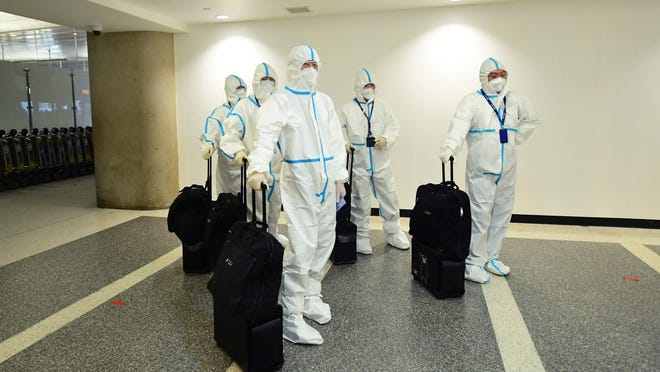
Two pieces of good news about omicron to take into the new year: It may not be around for long, and people who are fully vaccinated don't need to worry, as long as they have a healthy immune system. Because omicron is so incredibly contagious, medical experts say its peak isn't likely to last long.
It's already burned through South Africa since it was first identified the day before Thanksgiving and cases are falling there. In the week ending Dec. 26, the number of newly diagnosed had dropped nearly 36% from their peak a week earlier, according to a USA TODAY analysis of Johns Hopkins University data.
If the Northeast, which has been battered by COVID-19's omicron variant over the past two weeks, follows the same pattern, it could see falling case rates as soon as mid-January, though since the U.S. is so large, it's likely to take time to move across the country, experts say.
The news is even better for people with the vaccine. Although two shots are not as protective against omicron as they were against previous variants, vaccination and boosting seem to make a big difference in people with a healthy immune system.
Also in the news:
► The CDC now says it erred last week when it said that more than 70% of U.S. coronavirus cases in the week ending Dec. 18 were omicron variant. Turns out the number was more like 22%. But the rate of omicron is rising fast – the week ending Christmas Day the number was almost 60%.
►On the heels of the CDC’s new guidelines that have shortened the window of isolation for individuals who have tested positive for COVID-19, the NFL and NBA shortened the amount of time that team personnel will have to quarantine.
► COVID-19 antigen tests may have "reduced sensitivity" in detecting the omicron variant, the Food and Drug Administration cautioned Tuesday.
📈Today's numbers: The U.S. has recorded more than 53.1 million confirmed COVID-19 cases and more than 820,000 deaths, according to Johns Hopkins University data. Global totals: More than 282.7 million cases and 5.4 million deaths. More than 205 million Americans – 61.9% – are fully vaccinated, according to the CDC.
📘 What we're reading: Omicron could force many workers who test positive to quarantine under federal mandate, intensifying labor shortages.
Keep refreshing this page for the latest news. Want more? Sign up for USA TODAY's free Coronavirus Watch newsletter to receive updates directly to your inbox and join our Facebook group.
Smithsonian shutters 4 museums until Monday due to surge
The Smithsonian's National Museum of African Art, the National Postal Museum, the Anacostia Community Museum and the National Museum of Asian Art (Freer Gallery of Art and Arthur M. Sackler Gallery) won't open today and are scheduled to reopen Monday, the Washington, D.C.-based agency said. The Smithsonian said in a statement that it has seen an increase in positive covid cases and quarantines among staff. The closures of these four museums will allow the Smithsonian to reallocate staff and keep all other museums open, the statement said.
The nation's capital has seen the largest increase in COVID-19 cases within the last week — cases have surged by 597% compared to the previous week.
"The Smithsonian strives to keep as many of our museums open to the public as possible without sacrificing the health and safety of our visitors and staff," the statement said.
1,000 flights already imperiled Wednesday as airline woes continue
More than 1,000 Wednesday flights across the nation were either canceled or delayed before the day barely got started. There there are already 741 cancellations and 431 delays within, into and out of the U.S. this morning, according to FlightAware, which tracks the status of flights. Thousands of flights have been delayed or canceled over the past several days as airlines grapple with wicked weather across parts of the West and staffing shortages due to the latest surge in coronavirus infections. On Tuesday alone almost 1,300 flights were canceled and over 7,400 were delayed.
2021 ending with daily infection records
The final days of 2021 will be marked by the U.S. shattering its previous record for daily coronavirus cases. Monday's count of over 500,000 new cases was higher than the nation's previous record of more than 303,000, a USA TODAY analysis of Johns Hopkins University data shows. Washington, D.C., along with seven states reported their worst weeks for new COVID-19 cases on Monday, Johns Hopkins University data shows — even with Christmas interrupting testing. Both Georgia and Washington state eclipsed their previous records for daily COVID-19 cases on Tuesday, and hospitalizations soared in California and North Carolina.
California's COVID-19 hospitalizations have risen 25% in last week, the Los Angeles Times reported, and North Carolina's Department of Health and Human Services reported that almost 22% of tests performed on Sunday were positive.
Tested positive for COVID during the holidays? Here's what to do.
Testing positive for COVID-19 starts a confusing, disruptive and at times frightening process – one that millions of Americans will likely go through in the coming week.
First, you need to isolate. That’s a more intense version of quarantining – it means cutting off contact with other people as much as possible so you reduce the chance of infecting them. This also means forgoing travel, not going to work and even limiting contact with people in your own household who aren't infected.
The CDC says isolating is a necessary step whether you’re vaccinated or unvaccinated, and whether you have symptoms or feel fine.
Everyone who tests positive for COVID-19 should monitor their symptoms. And people who are unvaccinated or at high risk for severe disease should be extra-vigilant for symptoms that might require emergency care. Call your doctor for early treatment options.
How long should you isolate? How long will I be contagious? What if you are in close contact with someone who tested positive? Here’s what you should know about omicron and COVID-19 this holiday season.
Contributing: Mike Stucka, USA TODAY; The Associated Press
Source link








